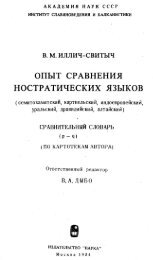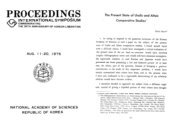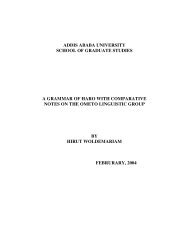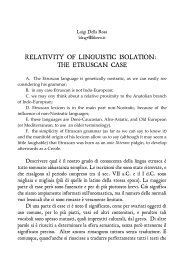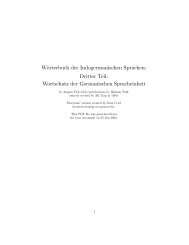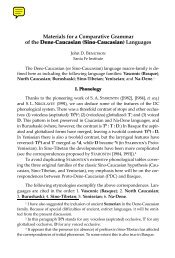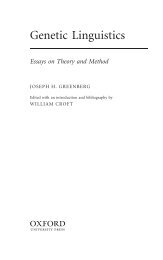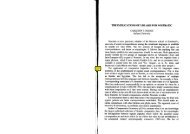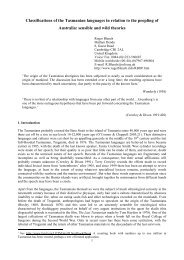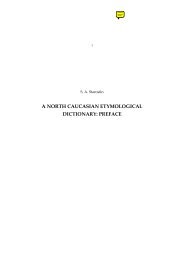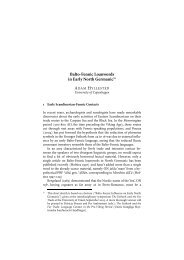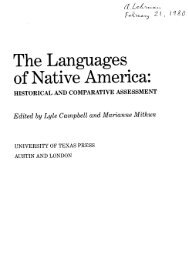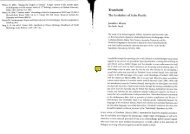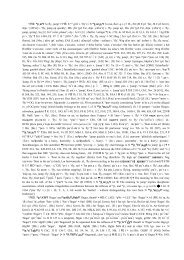The Indo-European Elements in Hurrian
The Indo-European Elements in Hurrian
The Indo-European Elements in Hurrian
Create successful ePaper yourself
Turn your PDF publications into a flip-book with our unique Google optimized e-Paper software.
purame (< *bh3-) ‘servant,<br />
slave’<br />
pu/wu-ú-ru (< *bh3-) ‘strong’<br />
(Catsanicos 1996)<br />
8. Comparison of <strong>Hurrian</strong> and <strong>Indo</strong>-<strong>European</strong> Vocabularies 125<br />
*bher-/*bhor-/*bh3- ‘to bear,<br />
to carry’ (Pokorny 1959:128—<br />
132; Walde 1927—1932.II:<br />
153—157; Mann 1984—<br />
1987:72, 73, 74, 74—75, 75,<br />
94, 95, 114, 115—116, 116,<br />
125)<br />
*bher-ĝh-/*bhor-ĝh-/*bh3-ĝh-<br />
‘(adj.) high, tall; great, strong;<br />
(n.) mounta<strong>in</strong>, hill’ (Pokorny<br />
1959:140—141; Walde<br />
1927—1932.II:172—174;<br />
Mann 1984—1987:74 and<br />
125; Kloekhorst 2008:636—<br />
637)<br />
‘perception, knowledge,<br />
thought, understand<strong>in</strong>g,<br />
<strong>in</strong>telligence’; Greek ðåýèïìáé<br />
‘to learn of’; Lithuanian budjti<br />
‘to be awake’; Old Church<br />
Slavic bÞdrti ‘to be awake’,<br />
buditi ‘to awaken’, bÞdrÞ<br />
‘watchful’; Gothic *biudan <strong>in</strong>:<br />
ana-biudan ‘to order, to<br />
command’, faur-biudan ‘to<br />
forbid’; Old English bēodan<br />
‘to offer’, on-bēodan ‘to<br />
announce, to tell; to<br />
command’, for-bēodan ‘to<br />
forbid’; Old Saxon biodan ‘to<br />
order, to offer’; Old High<br />
German biotan ‘to order, to<br />
offer’, far-biotan ‘to forbid’<br />
Sanskrit bh0tya- ‘a servant, a<br />
dependent’; PāJi bhasa- (<<br />
bh0tya-) ‘hirel<strong>in</strong>g, servant,<br />
soldier’; Bengali bha0 ‘soldier,<br />
servant’; Lithuanian bérnas<br />
‘lad, boy; hired man, farm-<br />
hand’<br />
Hittite pár-ku-uš ‘high’;<br />
Sanskrit b0hánt- ‘high, tall,<br />
great, strong’; Avestan<br />
b‹r‹zant- ‘great, lofty’;<br />
Armenian barjr ‘high’; Welsh<br />
bre ‘hill’; Gothic *bairgs<br />
‘mounta<strong>in</strong>’, baurgs ‘city,<br />
town’; Old Icelandic bjarg,<br />
berg ‘mounta<strong>in</strong>, rock’, borg<br />
‘stronghold, fortification,<br />
castle; fortified town, city’;<br />
Old English beorh, beorg ‘hill,<br />
mounta<strong>in</strong>’, burg, bur(u)h<br />
‘fortified place, (fortified)<br />
town, city’; Old High German<br />
berg ‘mounta<strong>in</strong>’, burg<br />
‘fortified place, castle, city’;<br />
Tocharian B pärkare ‘long’;<br />
Greek ðýñãïò ‘tower’ (pre-



